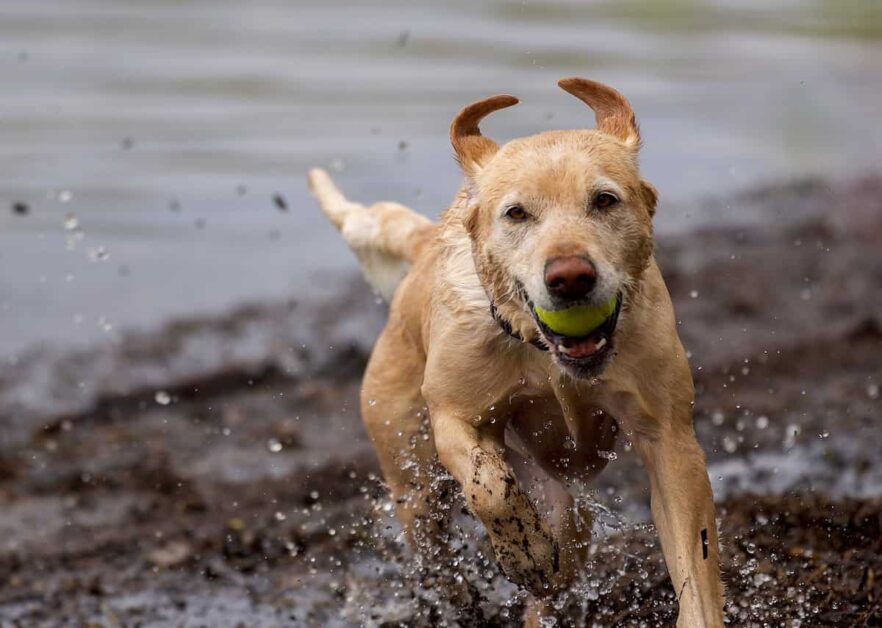Labradors may behave like any other dog breed if they’re not properly trained or socialized. But they aren’t likely to bite without reason. They are one of the gentler breeds, unlike the pit bull terrier.
Neither are they an aggressive dog breed nor fighting dogs. Today, we’ll explore the reasons behind biting behavior, types of bites, prevention tips, and more. You’ll get a full scope of creating a safe environment for your beloved furry friend.
Decoding Why Dogs Bite And Body Language
Labradors are friendly and outgoing, making them popular as family pets. However, understanding Labrador’s behavior is essential to prevent negative actions like biting.
The Labrador Retriever Temperament
Labradors are renowned for their good-natured temperament. They’re patient and gentle around children, making them an ideal choice for families with young kids. Their eagerness to please makes them easy to train and well-suited as guide dogs. Their calm demeanor means that they don’t often bark or become aggressive without reason.
However, they require socialization from an early age so that they become comfortable in different situations. Labradors can be prone to separation anxiety if left alone for long periods. Bear this in mind when planning daily routines.

Factors That Influence Labrador Retrievers Behavior
Several factors influence a Labrador’s behavior, including genetics and early socialization. Labradors with aggressive parents may be more prone to biting than those from calmer bloodlines.
Also, a lack of proper socialization during the critical period of 3-14 weeks old can lead to anxious behavior. Dogs bite because of negative experiences with people, other breeds, or the same breed, pain or health issues, or inadequate training.
As responsible owners, try to recognize these influences and take steps to prevent aggression before it becomes an issue. Understanding the temperament and needs of your Labrador will promote positive behavior through consistent training.
Does The Labrador Dog Bite?
Labradors can bite, but it is not a common breed trait. However, there are several reasons why Labradors may bite, including anxiety or fear.
Here Are The Reasons Why Labradors May Bite
Labradors may exhibit biting behavior under certain circumstances. One of the main reasons is fear or anxiety is if a dog feels threatened, it may resort to biting as self-defense. Watch out for the warning signs and address them appropriately.
Another reason is due to a lack of socialization and training. Dogs not exposed to people or animals become aggressive around unfamiliar stimuli. Fearful dogs act out.
This may lead them to use biting as a defense mechanism. Proper socialization from an early age can help prevent this behavior. Even well-trained dogs can bite if provoked or perceive a threat to themselves or their family.
Be careful when introducing new pets into the household or with strangers. Be vigilant around children; they can hurt your pet through rough play.

Common Triggers For Dog Bites
Triggers for biting and dog attacks include fear and anxiety, pain from an injury or illness, guarding food or toys, and feeling threatened. Another trigger is boredom and lack of exercise. These active dogs require plenty of physical activity to release energy and prevent destructive behavior.
Children sometimes try to remove items from the dog’s mouth. It’s dangerous. Always supervise. Providing adequate exercise helps reduce the likelihood of such behavior.
Types Of Labrador Bites
The first type is the playful dog bite, usually with puppies and young Labradors. This is not meant to harm anyone but rather a form of playfulness.
The second labrador bite type is the defensive bite, when a Labrador perceives a threat to their pack or territory. Never provoke your dog in such situations.
how to stop a lab puppy from biting?
Stop Biting With Positive Reinforcement Training Techniques
Positive reinforcement training is highly effective for training Labradors and encouraging good behavior. It involves rewarding desired behaviors with treats, toys, or praise, strengthening the recurring behavior.
Clicker training is another form of positive reinforcement that uses a clicking sound to signal when the dog has performed a desirable action.Consistency is key to achieving successful results when using these techniques on Labradors. Be patient and never resort to punishment, which can have negative consequences.

Socialization And Obedience Training
Socialization and obedience training develop good behavior. Start socializing your puppy at a young age (8-14 weeks).Your Labrador learns how to interact with others without reacting aggressively. Formal training establishes boundaries and expectations. Properly trained Labradors become loving family pets that can be trusted around children and other animals.
Consistent Behavior Management
Consistency is key when it comes to managing Labrador behavior. Set clear rules and boundaries, and stick to them. This means everyone in the household needs to be on the same page and enforce these guidelines consistently.
For example, if jumping on people is not allowed, no one should allow it. Even if they think it’s cute or funny sometimes. Inconsistency can confuse a Labrador and lead to unwanted behaviors.

Signs Of Aggression In Labradors
Labradors may show aggression through growling, snapping, and other aggressive behaviors that can escalate if not addressed properly.
Growling
Growling indicates discomfort or warning behavior. It can be the result of pain, fear, or anxiety. Never ignore and take it as a sign that something is bothering your dog.
When labradors growl, they are communicating distress or unease. They may feel threatened by an unfamiliar person or animal, protecting their territory or resources such as food or toys.
If your Labrador exhibits this behavior, intervene immediately and address it to prevent escalation into biting behavior. With proper training and socialization from the beginning to adulthood, growling reduces.
Snapping
Snapping is a common behavior of Labrador Retrievers that can be concerning. It can be a warning sign indicating fear, anxiety, or pain.
If your Labrador snaps at you, seek professional help from a behaviorist or vet to determine what caused this aggressive response. Positive reinforcement training can work wonders
Other Aggressive Behaviors
Other aggressive behaviors includes lunging or charging at people or animals and biting without warning. Some Labradors may also display resource-guarding aggression, which involves protecting their food or toys from others. This can be dangerous if left unchecked and requires careful management.

how to get lab puppy to stop biting?
Seek professional help to address any underlying health issues. Take responsibility as an owner to address aggressive behavior in Labradors.
Seeking Professional Help
A certified animal behaviorist or dog whisperer/trainer can identify the causes of aggression and develop a personalized training plan.
The trainer will work with you on managing and modifying your dog’s behavior effectively. Aggression can cause significant harm, so consistently implement the recommended strategies. Medical conditions such as thyroid or hormonal imbalances can aggravate or cause aggressive behavior.
Addressing Any Underlying Health Issues
Have your Labrador regularly checked by a veterinarian to rule out any medical conditions that may lead to aggression. Sometimes, addressing these issues can help reduce aggressive behavior. Anxiety is among the most common health issues associated with aggressive behavior in dogs. A safe and structured environment is the need of the hour.

Taking Responsibility As An Owner
As a Labrador owner, take responsibility and address any aggressive behavior your dog may display. This includes socializing your dog early and providing consistent training using positive reinforcement techniques.
If your Labrador has bitten someone or another animal, it’s your responsibility as their owner. Seek professional help immediately to address the issue before it becomes worse.
You must comply with any legal obligations regarding reporting bites in your area. Remember that owning a pet is a significant responsibility, including protecting them and those around them from harm.
Legal Obligations: Labrador Bite Statistics
Labrador owners should know the legal obligations of owning a dog exhibiting aggressive behavior. In many states, dog owners are held liable for any significant damage or injuries caused by their pets. Some jurisdictions even require mandatory reporting of biting incidents to local authorities or animal control services.
Breed-specific legislation exists in some parts of the country, which bans certain breeds from ownership due to an assumption that they are more likely to be aggressive. However, no breed is inherently dangerous, and every dog has the potential to bite if provoked.
Secure your pets on your private property with appropriate fencing or confinement methods. Dog bites can cause harm and emotional distress. Being informed about legal obligations is necessary.

Other Tips For Preventing lab puppy biting
Providing Adequate Exercise
Adequate exercise is key for overall well-being. Regular physical activity reduces stress and anxiety levels.
Labradors typically require at least 30 minutes to an hour of daily exercise, including brisk walks or runs, depending on their age, breed, and overall health. Moreover, it helps prevent obesity, joint issues, or heart disease. Ensure enough playtime for your dog daily.
Avoiding Overstimulation
Overstimulation can commonly trigger biting in puppies. Excessive play and roughhousing may lead to excitement, sometimes escalating into aggressive behavior. As an owner, monitoring your dog’s body language during playtime is as important as intervening if necessary.
A well-exercised dog is less likely to act out of excessive energy or boredom. Meeting their physiological needs for exercise will help prevent behavioral issues such as biting due to excess stimulation.
Creating A Safe And Structured Environment
As pack animals, dogs thrive on routine, structure, and clear boundaries. Providing them with consistent guidelines helps regulate their behavior and reduce stress levels. You can achieve this by setting meal times, playtime, training sessions, and rest periods.
Also, you must create a physically secure space for your Labrador. Fencing off the yard or using secure leashes during walks are practical measures. Check your home environment for hazardous items, such as sharp objects or toxic chemicals that might cause injury if pets ingest them.

Monitoring Interactions With Other Animals And Humans
Don’t forget to monitor the interactions between your Labrador and other animals. Labradors do feel threatened by unfamiliar people or pets in their space. Always supervise playtime and introduce new dogs cautiously, giving them time to get acquainted. Teach children how to interact with the dog properly.
Conclusion
In conclusion, understanding Labrador’s behavior is key to having a happy and safe relationship with the most popular dog breeds. Recognizing the common triggers and types of biting behavior can help you take precautionary steps. Positive reinforcement techniques and consistent training will go a long way in creating good behavior habits.
Ultimately, being a responsible dog owner means taking responsibility for your dog’s actions and addressing any aggressive behaviors that may arise.
FAQs
do labrador retrievers bite?
Labradors are generally friendly and obedient dogs, but like all dog breeds, they may exhibit biting behavior. Especially when feeling threatened or scared. Proper training and socialization can help prevent aggressive behavior from escalating.
when do lab puppies stop biting?
To train your Labrador not to bite, you should start with basic obedience training as early as possible. Socialization is paramount to expose them to various people, situations and animals during their critical development period. Use positive reinforcement techniques like treats or toys to incentivize good behavior.
What happens if my Labrador bites me or someone else?
If a Labrador bites someone unexpectedly, clean the wound immediately with soap and water. Then, consult with a medical professional for additional care. You can prepare for legal ramifications depending on your state law.
What other behaviors should I be aware of regarding Labradors?
Apart from biting tendencies, no major issues are reported regarding Labs. However, some labs may be over-friendly, which asks for socialization. Combined with their size, this trait makes them prone to knocking things down while trying to get closer. Excessive barking might occur at times due to frustration stemming from boredom.
what is the bite force of a Labrador retriever?
Labradors have a bite force of 236 PSI, similar to a pit bull terrier but have soft mouths for penetrating fowls.
Author Profile
- Site Owner And Dog Lover
-
Aritra, the founder of Labradorandyou.com, is a lifelong dog lover whose passion ignited for Labradors for their loyalty and intelligence. With extensive research and personal experiences, Aritra has become a Labrador expert, offering a rich resource on the breed. Labradorandyou.com provides reliable, timely, and evidence-based information, including Labrador-specific product reviews, training techniques, and care tips.
Labradorandyou.com was born out of Aritra's passion and his desire to share his profound knowledge about the breed. The site serves as a comprehensive resource, offering a wealth of up-to-date information for Labrador owners and enthusiasts alike
Also by the author
-
 Lab-TypesNovember 17, 2023Old Dog Seizures: Causes, Symptoms, and Treatment Options
Lab-TypesNovember 17, 2023Old Dog Seizures: Causes, Symptoms, and Treatment Options
-
 Lab-TypesNovember 17, 2023Why Is My Dogs Poop Yellow? 8 Reasons & Solutions
Lab-TypesNovember 17, 2023Why Is My Dogs Poop Yellow? 8 Reasons & Solutions
-
 ReviewsNovember 17, 2023The Only Hill’s Science Diet Review You Need To Read
ReviewsNovember 17, 2023The Only Hill’s Science Diet Review You Need To Read
-
 Lab-TypesNovember 17, 2023How To Adopt An Emotional Support Dog?
Lab-TypesNovember 17, 2023How To Adopt An Emotional Support Dog?





